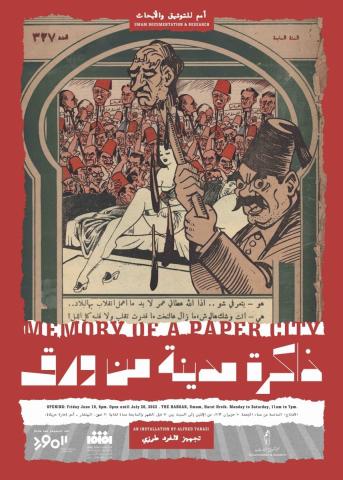
The installation Memory of a Paper City by Alfred Tarazi is ongoing!
Thursdays to Saturdays, 3-7 PM (or by appointment) @ The Hangar (UMAM D&R)
From the disintegration of state institutions to the endemic neglect and destruction of its cultural heritage, Lebanon’s modern cultural and social legacy is in peril. In past years, the country has seen its cultural hubs crumble: publishing houses, theatres, cinemas, recording studios…all the cosmopolitan institutions that marked the modern history of Lebanon have been vanishing. Perhaps the most volatile and fragile material these institutions have produced is paper. Many defunct Lebanese publishing houses for instance have seen their archives scattered, destroyed and irretrievably lost. The subject matter of this exhibition is paper and most specifically the paper onto which these publishing houses have inscribed the spirit of their times. Laboriously produced and reproduced, these papers carry the traces of Lebanon’s turbulent experience in modernity.
Following the thread of over a hundred publications from the nineteen thirties till the end of the eighties, this project aims to map out two distinct phenomena that instil these publications. The first consists of the uses and misuses of the representation of women as a metaphor for freedom and sexuality. The second is the representation of political violence manifesting itself in armed struggle. The correlation between both phenomena is the constant flirtation, invitation or assessment of the numerous transgressions that mark the modern history of Lebanon. Here, violence and corruption are endemic and the press acts both as a tool to shape opinions or to denounce these very transgressions. In this realm, images are weapons used to bring down governments and words are bombs threatening to reduce the nation to ashes. In this realm, images lure us away from morality and words destroy all sense of religiosity. The tools are revolutionary, the messages are revolutionary, the outcome however is grim. Civil violence systematically overtakes the streets.
Presently, the tools have changed, but the war has not. Words and images are still the main manifestation of the rift that divides the Lebanese. The charged social media landscape of today is the evolution of this world made out of paper. In this continuous violence the task that seems most urgent is to preserve these papers, not primarily for the news, the politics and horror but for the very artistry with which these images were made. In this realm, writers, artists, calligraphers, illustrators, caricaturists, photographers and advertisers all worked hand in hand to sell their ideas, their products, a way of life: modernity. Even our wars seem to be a celebration of this modernity. These papers reflect the tension, always present, to this very day between the traditional values that govern Lebanese societies and the most novel tunes and ideas rocking the world. It paints an image of this country, this distorting mirror of the west and deforming echo chamber of the east and in the dissonance, a feast for the eyes. That is until corpses fill the streets and the saturated pages of the Lebanese printed realm. Here, we celebrate the makers of these images and ponder about the price paid for this emancipation.
Our freedom urgently stands now as a blank piece of paper; an undrafted piece of paper carrying all the possibilities of progress and change that can happen. In that regard, this is not a place of freedom but of reckoning. A place to reflect on the history of a city of paper, a place of madness buzzing with creativity yet ever so threatened, ever so fragile.
With the support of Arab Fund for Arts and Culture (AFAC) and Culture Resource (Al-Mawred Al-Thaqafy).
